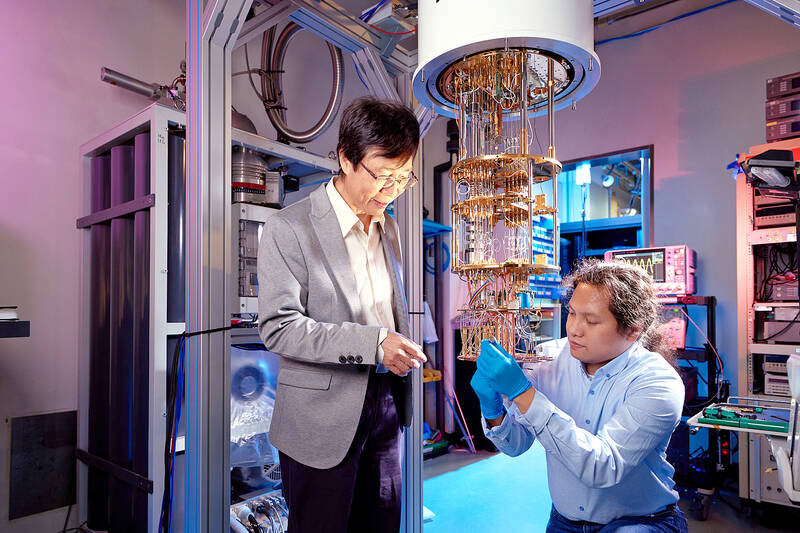Academia Sinica yesterday unveiled a quantum computer based on 5-quantum-bit (qubit) chips, connecting the device to the Internet to enable its use in scientific research by the institution’s members and partners.
The computer’s launch marked another milestone in the nation’s research into and development of quantum computing following the chip’s creation in October last year, said Chen Chii-dong (陳啟東), a research fellow at Academia Sinica’s Research Center of Applied Sciences.
Researchers participating in the Ministry of Science and Technology’s project accomplished the objectives ahead of the ministry’s schedule, which had stipulated the development of 3-qubit chips by February last year, he said.

Photo courtesy of Academia Sinica
The Taiwanese quantum computer’s logic gate reached a 99.9 percent fidelity rate, he added.
Although great strides have been and are being made in quantum computing technology, there is still a long way to go for its practical application in the commercial sector or for personal use, Academia Sinica said.
The 5-qubit computer is now available for use as a test and development platform for quantum computing, ultra-low temperature complementary metal oxide semiconductor (CMOS) and operational amplifier research programs, it said.
The Taiwanese research team has consistently outperformed expectations despite being given less time and resources than the quantum computer research programs of foreign nations, Academia Sinica President James Liao (廖俊智) said.
The program’s successful achievements are a basic part of the technology, and researchers need time to resolve foundational problems before breaking through the next bottleneck, he said.
Academia Sinica’s work in quantum computing is intended to blaze a trail for the nation’s private sector and generate the momentum necessary to sustain the investment in talent and education, Liao said.
Taiwan’s quantum computing project is a collaboration between Academia Sinica, the Industrial Technology Research Institute, National Changhua Normal University, National Central University, National Chung Hsin University, the University of California, Santa Barbara and the University of Wisconsin-Madison, it said.

Auckland rang in 2026 with a downtown fireworks display launched from New Zealand’s tallest structure, Sky Tower, making it the first major city to greet the new year at a celebration dampened by rain, while crowds in Taipei braved the elements to watch Taipei 101’s display. South Pacific countries are the first to bid farewell to 2025. Clocks struck midnight in Auckland, with a population of 1.7 million, 18 hours before the famous ball was to drop in New York’s Times Square. The five-minute display involved 3,500 fireworks launched from the 240m Sky Tower. Smaller community events were canceled across New Zealand’s

The Ministry of Foreign Affairs (MOFA) yesterday said it is closely monitoring developments in Venezuela, and would continue to cooperate with democratic allies and work together for regional and global security, stability, and prosperity. The remarks came after the US on Saturday launched a series of airstrikes in Venezuela and kidnapped Venezuelan President Nicolas Maduro, who was later flown to New York along with his wife. The pair face US charges related to drug trafficking and alleged cooperation with gangs designated as terrorist organizations. Maduro has denied the allegations. The ministry said that it is closely monitoring the political and economic situation

UNRELENTING: China attempted cyberattacks on Taiwan’s critical infrastructure 2.63 million times per day last year, up from 1.23 million in 2023, the NSB said China’s cyberarmy has long engaged in cyberattacks against Taiwan’s critical infrastructure, employing diverse and evolving tactics, the National Security Bureau (NSB) said yesterday, adding that cyberattacks on critical energy infrastructure last year increased 10-fold compared with the previous year. The NSB yesterday released a report titled Analysis on China’s Cyber Threats to Taiwan’s Critical Infrastructure in 2025, outlining the number of cyberattacks, major tactics and hacker groups. Taiwan’s national intelligence community identified a large number of cybersecurity incidents last year, the bureau said in a statement. China’s cyberarmy last year launched an average of 2.63 million intrusion attempts per day targeting Taiwan’s critical

‘SLICING METHOD’: In the event of a blockade, the China Coast Guard would intercept Taiwanese ships while its navy would seek to deter foreign intervention China’s military drills around Taiwan this week signaled potential strategies to cut the nation off from energy supplies and foreign military assistance, a US think tank report said. The Chinese People’s Liberation Army (PLA) conducted what it called “Justice Mission 2025” exercises from Monday to Tuesday in five maritime zones and airspace around Taiwan, calling them a warning to “Taiwanese independence” forces. In a report released on Wednesday, the Institute for the Study of War said the exercises effectively simulated blocking shipping routes to major port cities, including Kaohsiung, Keelung and Hualien. Taiwan would be highly vulnerable under such a blockade, because it